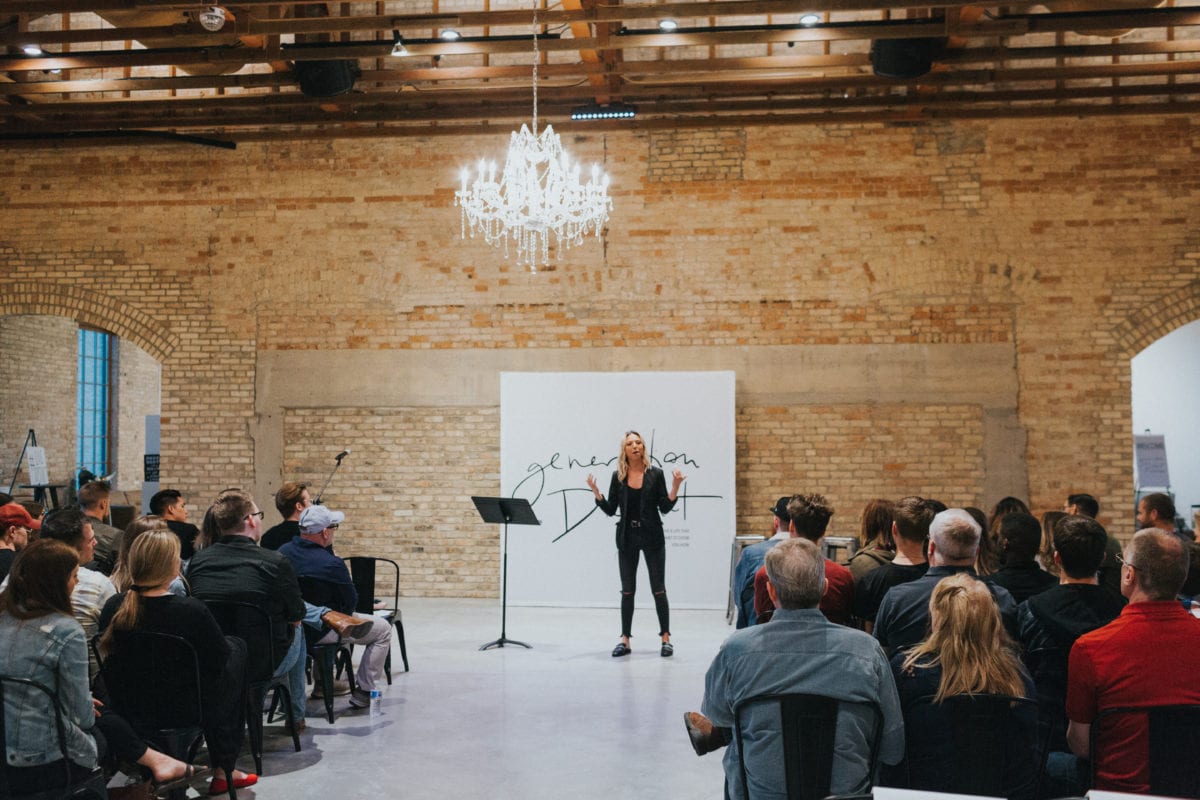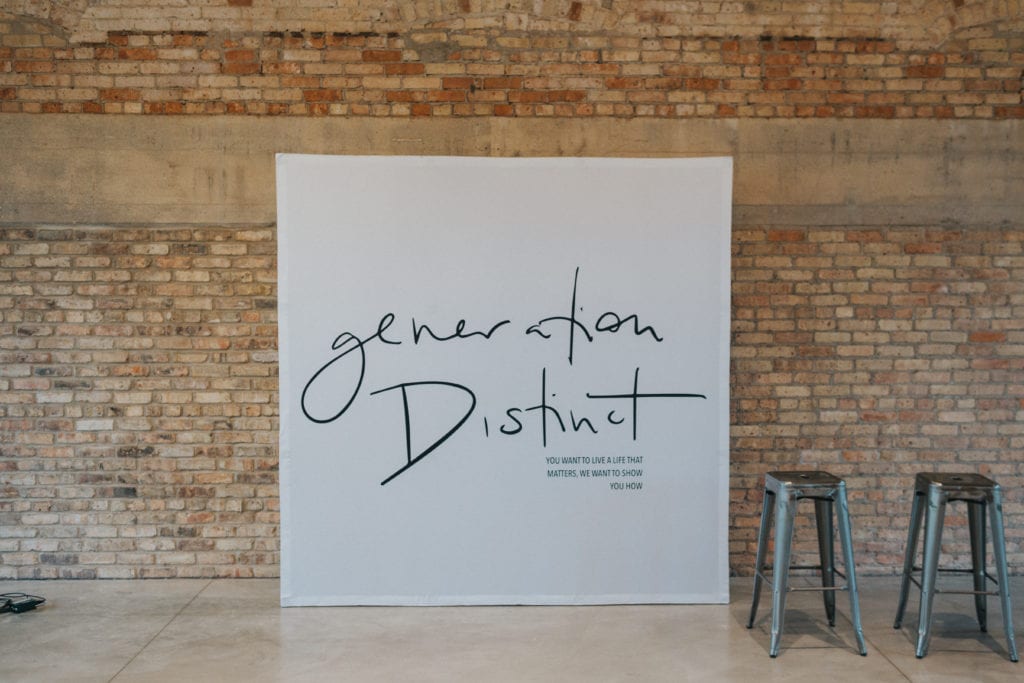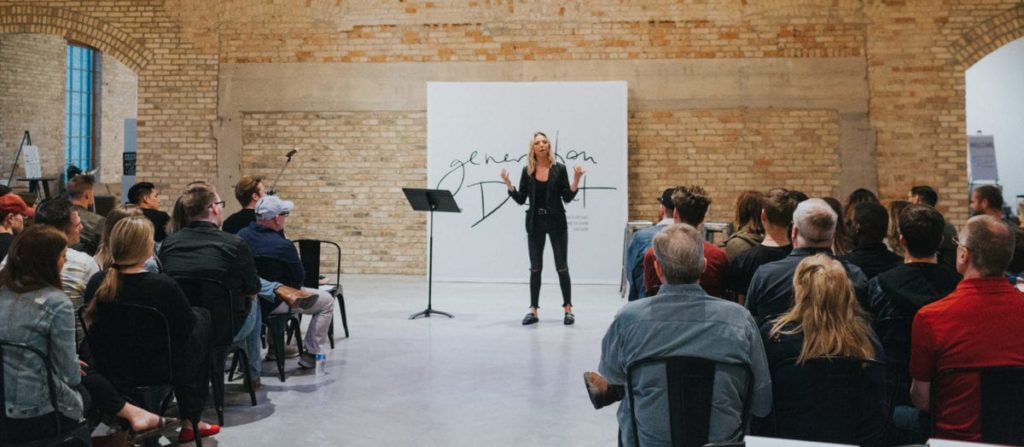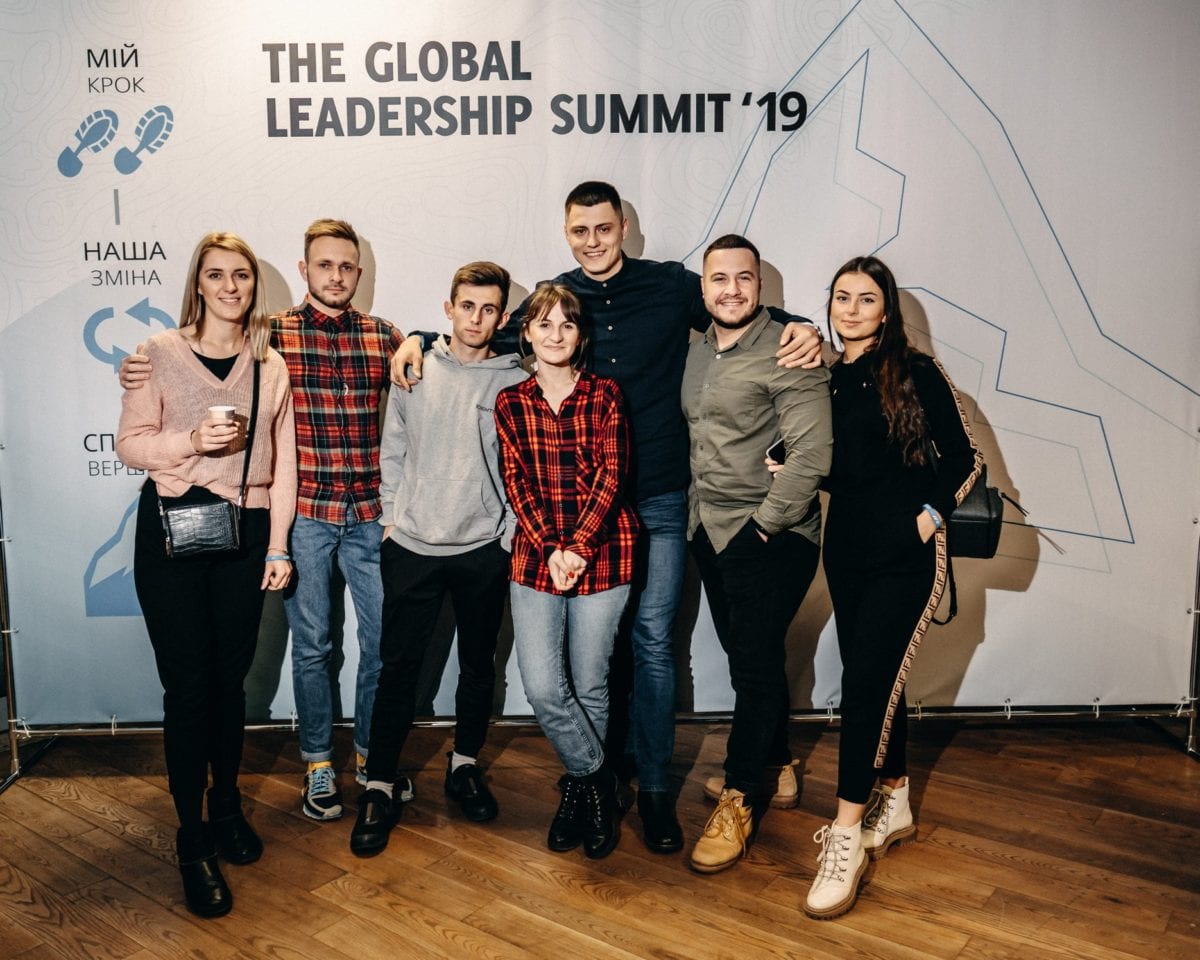
Todd Henry identifies three key questions you should ask yourself as you are working to identify your life’s passion.

Todd Henry identifies three key questions you should ask yourself as you are working to identify your life’s passion.

“Krish, you wear your heart on your sleeve.”
People often say this to me, and I am not sure it is meant as a compliment. But I take it as one anyway. I would rather be emotionally free and vulnerable than inviolable but trapped.
Leading with heart is my natural tendency.
But sometimes people say heart leadership will not work in the business world. They say business requires a cold heart and a hard head. A hard-driving stoic leadership is required to stay focused on your targets and elbow your way through the rat race to success while others around you fail.
I believe things are changing. More and more business leaders are recognizing that business needs a purpose beyond the bottom line.
Your heart is a great navigator to finding purpose. It seeks the magnetic north of meaning in your work and it will be restless until it finds it. A friend of mine put it this way, “I don’t want to just make money, I want to make a difference.”
My work is a heart passion of mine.
I run a charity focused around finding loving homes for every child who needs one. It is a charity that developed out of our family’s experience of adoption and fostering. Caring for vulnerable children is the most challenging and yet most rewarding thing our family does.
..business needs a purpose beyond the bottom line.
But I can only help one or two at a time. What about the thousands of others who need love and security?
I think about it at breakfast when I am setting the table with my child who has additional needs. I think about it at bedtime after reading “Where’s the Wookie” book (again) with my 9-year old foster son. I can’t look at my own children without worrying about the others I can’t help. So, I love it when I hear that another child has been adopted. I love it when someone has been inspired to foster. I love hearing that unaccompanied asylum-seeking children are getting a family to care for them.
There are great joys and great dangers in leading with your heart.
Leading with your heart is an exhilarating way to lead. Knowing what you are doing really matters, knowing that you can be proud of what you are achieving because it is not just serving your bank balance, but actually making the world better for people, leads to no greater feeling. We discover a joy in our work that can’t be robbed from us no matter how much money we do or don’t make, whether things at work are going well or not. It helps you get up in the morning and sleep well at night.
I recently spoke to a passionate leader who runs a children’s village for over 3,000 children. I asked him whether he had any plans to transition children to families—based on the research that children raised in families have a far greater chance of success in life than those raised in institutions. Family-based care is in line with UN best practice and his country’s stated national intention. He shook his head. “Oh no. God told me to run a children’s village, so I will run a children’s village. It doesn’t matter what you say.”
Leading with your heart can sometimes make you stubborn. It can sometimes make you blind.
If your heart is not in your work, if you cannot get passionate about leading where you are, then you have to ask yourself if you are in the right place.
It takes investment in good accountable relationships to try and help with work-life balance. And it needs a posture of humility so we can allow our leadership to be shaped, not just by hunches, passion and determination, but by evidence, truth and discrimination.
I believe you cannot lead well if you are not leading with your heart.
If your heart is not in your work, if you cannot get passionate about leading where you are, then you have to ask yourself if you are in the right place.

Get free, instant access to GLS Podcast Episode Show Notes. Leverage episode summaries, key takeaways, reflection questions, resources mentioned, related links and applicable downloads.
You were encouraged to become a leader. You believe that leadership is the reward for all your hard work. However, now that you’ve attained the title, you find parts of the job to be really difficult—and you find yourself saying, “I didn’t sign up for this!” Patrick Lencioni suggests that you should examine your motive for becoming a leader in the first place. He says that leadership is not a reward. Instead, leadership is a responsibility and a burden worth bearing for others. You are not going to want to miss this convicting and insightful conversation drawing practical application from Pat’s newly-released book, The Motive.
1. In this conversation, Patrick Lencioni discussed five omissions that rewards-centered leaders often neglect to do. These are the parts of the leadership job where you might be tempted to say, “I didn’t sign up for this.” Think about your own leadership. Which of the omissions are the most tempting for you to neglect? Check all the boxes that apply.
Omission #1: Difficult Conversations
Omission #2: The Work of Management
Omission #3: Preparing and Running Meetings
Omission #4: Team-Building
Omission #5: Repeating Themselves
2. Look at all the boxes you checked. If you are being completely honest with yourself, do your responses indicate that you may not be leading for the right reason? Have you fallen into the trap of rewards-centered leadership?
3. What would it look like if you could shift your perspective on the omissions you checked—and look at them as your leadership privilege and burden? How would your attitude change? How would your schedule change?
4. Commit to reflecting on your motives for leadership and making adjustments if necessary.
What’s Your Motive? Patrick Lencioni 2019 GLS Talk
The Motive: Why So Many Leaders Abdicate their Most Important Responsibilities
“You’re not in Kansas anymore.”

My first experience with The Global Leadership Summit was as a volunteer. I was just a kid at the time, maybe 10 years old. My siblings, friends and I would spend most of our time out in the lobby. Then the doors would open, and all these leaders would come out, and I was there handing out snacks and coffee. I started to look at their name tags and where they were from. I asked them questions and they took time to invest in me and showed me so much kindness. It was a beautiful picture—a global group of leaders gathering in one place to learn together about how to impact their communities in a positive way. In those moments as a kid, I started to realize something—leadership matters. Even at my young age, I felt a part of something important.
When I turned 13, I said, I want to be in the room! I want to be like all the leaders I’ve been meeting the past few years. At 13, I started attending the Summit.
Looking back, I don’t actually remember a time when leadership content wasn’t a part of my life. So, now as a young leader, there are things that come as second nature to me because they’ve been ingrained in me. When you learn leadership content when you’re older, sometimes you have to unlearn a lot of negative things, but because I started so young, it will save me from a lot of undoing. My parents were also very intentional to foster learning in our home. We were always going to the Summit, listening to messages together or reading books that were written beyond our age level. At the Summit, hearing the message that everyone has influence as a 13-year-old really shaped who I was. I remember growing up thinking, maybe I can lead.
I remember growing up thinking, maybe I can lead.
It’s easy to go to a leadership conference and write yourself off saying, I don’t fit in because I’m not leading an organization, or I’m only 13. But because I heard that message over and over—everyone has influence—I saw my life in a different way. I realized my life isn’t just about me. If everyone really has influence, leadership development matters, even as a 13-year-old. Most people start working on leadership development after they realize they are a leader, but what I loved about me growing up in that leadership environment, is that I started learning leadership development before becoming a leader. If more young people could be at the Summit, catch that vision and see that the content is for them, no matter where they are, it would not only shape them for the future, it would shape the future of our world.
When I was 16, I had a lot of people saying, you have leadership potential. Even my pastor sat down with me and said, I see that you are a leader and a world changer. Those “I see in you” conversations are transforming.
Those “I see in you” conversations are transforming.
I grew up listening to the Grander Vision stories at the Summit and hearing about people who had this moment when something shifted and then they took action. And at 16, I wanted that story to be true in my life.
Because of the way I was raised and because I was exposed to leadership conferences from an early age, I developed a different perspective on what could be for my generation. I had this vision for what life could look like even as a student in high school. But as I was looking around at my peers, I felt like I wasn’t seeing this vision represented anywhere. I would go to youth group and think to myself, Why is there so much mediocrity? Why is there so much apathy? Why is it that all we care about are things that are temporary? And why are we wasting some of the most passionate years of our lives? There was a discontent brewing in me and all these messages telling me, You can do more right now! But who was telling my peers, You can follow your dreams now! You don’t have to wait until you’re older. I was hungry for this message for myself too.
I told God, I’m ready! I’ll do it! I’ll say yes! Just reveal what it is you want me to do!
In this same season, I had read a book about all the major injustices in the world in hopes of helping young people understand what they’re passionate about. I thought, Great! I’ll figure out what my passion is and get going! But I got to the end of the book feeling way more confused than I was when I started. I cared about all these issues, but I wanted to know what my passion was. I told God, I’m ready! I’ll do it! I’ll say yes! Just reveal what it is you want me to do!
Then I felt God impress on me, Hannah, you’re not called to solve all the injustices in the world. I want to use you to empower a generation to solve injustice in the world, and in so doing, you’ll have even greater impact.
I ran up to my bedroom, and I started writing out all these dreams, plans and ideas, thinking about what I could do to help my peers, and other young people, discover their passion, and not get stuck not knowing what to do with it. I wanted to help my peers pick a strategy around their passion and go out and do it. At age 16, that was my plan. But I put it on the back shelf, and said, I’ll do that when I’m older.
That discontent stayed with me as I went to work for a church. I started thinking it would be more comfortable to stay in church work than step out on my own. So, I thought I would be in ministry for the rest of my life. But some key people in my life challenged me, primarily my mom. She said, What about your dream, Hannah?
What about your dream, Hannah?
And I said, Yeah…but in the future. I’m only 20! I have no business degree, and I haven’t been in the workplace very long. I have very little that qualifies me for starting my own organization. And she said, If God is saying he will qualify you.
And God said, Why wait? Why not now, Hannah?
 I decided I wasn’t going to wait for someone else to solve my discontent for me. I wanted to build what my generation was hungry for. I made a deal with God, I’ll do this, but you have to provide the people who will train me and equip me to make this happen.
I decided I wasn’t going to wait for someone else to solve my discontent for me. I wanted to build what my generation was hungry for. I made a deal with God, I’ll do this, but you have to provide the people who will train me and equip me to make this happen.
It became even more confirming when I would run into people who wanted to mentor me, consult me and advise me in areas they were experts in, and for free! Thus began Generation Distinct.
Our legacy vision for Generation Distinct is to equip a generation that is radically committed to Jesus. Why? Because what we’ve found is that so often, young people are walking away from Jesus because they have passion, vision, desire for justice in this world, and they’re going to the Church with it, but they’re being shut down. They’re not finding an avenue in the Church or their Christian community that fans their flame, telling them, Your dream and your pursuit of Jesus are unified, and can go together.
…young people are walking away from Jesus because they have passion, vision, desire for justice in this world, and they’re going to the Church with it, but they’re being shut down.
What we’re seeing is that young people are still passionate, still fighting for justice and still using their voice, but they’re avoiding the Church and going in other directions because they’re finding it’s more acceptable.
Our mission statement is: Equip young leaders to discover the wrong they were born to make right, leading them to experience who Jesus really is. If we can help young people figure out their passion, what they’re created to do, how they can change the world and then show them that ultimately leads to the One who gave them those passions, then they’re not going to be following Jesus out of obligation. They’re going to be following Him because there is no greater adventure and no greater opportunity to change the world than by following this radical change-maker named Jesus.

What if we could re-introduce our world to who Jesus really is? If we can do that, we will see more injustices eradicated, truth released, love spread and unity established. Young people will understand that Jesus is not just a religious figure, a distant God, but He’s a rebel who started a movement and is inviting us to change the world.
I feel like God is using my leadership to be an example to other young women, showing them that they, too, can lead. There was a young woman who messaged me after I spoke at a university chapel, and she said, I want you to know I’ve recently felt a call to be a leader and I feel like everywhere I look, I don’t see anybody who looks like me doing it, so when I saw you on that stage, I realized I can do it too. Thanks for stepping out. It showed me that I have permission to step out too.
I want to see a world where I’m no longer the exception.
If I keep stepping out, I’m paving a way for others. I want to see a world where I’m no longer the exception. I want to see a world where it’s normal for a 24-year-old woman to be leading and speaking.
While leading this new organization, I’ve had to learn how to embrace failure, not just as a concept, but in reality. As a young organization, there were many moments when we made mistakes. But I feel like every time I go to the Summit, I realize I’m not the only one who struggles.
For example, I grew up listening to these world-class leaders say there were times they wanted to quit. So, when I start to feel those things as a leader, I don’t say, I don’t know what this means, I say, This is a part of leadership.
I did a lot of front learning through the Summit that helped prepare me for where I am today, even without a business degree. And to sit there with all these other leaders, listening to a speaker say something that resonates with me, and then to look to my side and see hundreds of others nodding their heads—it’s unifying. It’s realizing we’re better together and admitting that we’re all in the mess of leadership together. It’s messy and not perfect and these moments make me feel like I’m not alone. In those moments when I do feel alone, I can remember back to the Summit. And I think of the army of leaders who are a part of this GLN movement, all walking in this together, choosing to be leaders. It’s empowering.
Our world has never been in more need of great leaders. We need to be investing in our leadership even before we have the platform. I truly believe if more young leaders came to the Summit and made leadership development a part of who they are, they would see greater influence in their life and greater leadership in the future. Our churches, our companies and our countries would look different because those young leaders coming into those roles know what to do.
When we look at the roots of what the local church was built on, it is so aligned with the desires of the next generation. We are looking for sacrifice and we long for something that makes impact. We want to rally around a cause and we’re not afraid of getting dirty.We want to change the world. The early church was on a mission from God to transform our cities and our culture and there’s a generation ready to get back to what the church has always been about.
We need to be investing in our leadership even before we have the platform.
If we can have a generation that knows what great leadership looks like, and goes into those roles, then great leadership would become normal and quality of life would increase. We would see so much more unity in our world.
Leaders of young leaders need to be encouraging and make this a priority. And young leaders need to say, I need to be trained in leadership, even before I even think I’m a leader. Then they’ll be ready when God opens up the door of opportunity to lead. For any young person who wants to make an impact on the world, the very best first step they can take is investing in their leadership.
What better way to do that than at the Summit?
Listen to Hannah Gronowski, featured on the City Gospel Movements podcast, as she dives into her journey and challenges leaders to engage with her generation.

Every Tuesday and Thursday morning at 8:30 am CST, our staff gathers together to pray for our partners across the globe.
Please join us in prayer as we lift up the international Summit events happening this month. Pray for God’s anointing on every detail and that those who attend would leave feeling equipped, inspired and encouraged to lead the change they long for in their communities.
And if you have a prayer request, please share it with us in the comments. We would be honored to pray with you!
Bobo-Dioulasso, Burkina Faso
Ziguiudon, Senegal
Dubai, United Arab Emirates
Delhi, India
Kolhapur, India
Les Cayes, Haiti
Dallas, United States
Kappam, India
Madurai, India
Barcarena, Brazil
Matagalpa, Nicaragua
Cluj Napoca, Romania
Natal, Brazil
Surulere, Nigeria
Orebro, Sweden
Undisclosed country
Sikkim, Nepal
Taichung City, Taiwan
San Jose, Costa Rica
Limon, Costa Rica
Lima Centro, Peru
Ambato, Ecuador
Monrovia, Liberia
Santa Clara, Cuba
Chihuahua, Mexico
Cuernavaca, Mexico
Leon, Mexico
Mazatlan, Mexico
Pachuca, Mexico
Piedras Negras, Mexico
Tlaxcala, Mexico
Aguascalientes, Mexico
La Paz, Mexico
Minya, Egypt
Vizag, India
Ongole, India
Chennai, India
Madurai, India
Mysuru, India
Mumbai, India
Surat, India
Yobe, Nigeria
Baguio City, Philippines
Santarem, Brazil
Itatiba, Brazil
Colombo, Brazil
Recife, Brazil
Yamoussoukro, Ivory Coast
Maiduguri, Nigeria
Lagos, Nigeria
Heliopolis Cairo, Egypt
Bucuresti , Romania
Ibadan, Nigeria
Nassarawa, Nigeria
Odessa, Ukraine
Churchandpur, India
Ludhiana, India
Puerto Cabezas, Nicaragua
Sharjah, United Arab Emirates
Phnom Penh, Cambodia
Sandakan, Malaysia
Hubli, India
Indore, India
Nagpur, India
Warangal, India
Chisinau, Moldova
Escuintla, Guatemala
Singapore, Singapore
Hong Kong, Hong Kong
Placetas, Cuba
Monterrey, Mexico
Reynosa, Mexico
San Luis Potosi, Mexico
Xalapa, Mexico
Hermosillo, Mexico
Amman, Jordan
Mangalore, India
Orlando, United States
Trivandrum, India
Vizag, India
Udupi, India
Tiruvallur, India
Lucknow, India
Lagos, Nigeria
Palell, India
Monrovia, Liberia
Buchanan, Liberia
Sta Rosa, Philippines
Leon, Nicaragua
Fada N’ Gourma, Burkina Faso
Singapore, Singapore
Kota Kinabalu, Malaysia
Dnipro, Ukraine
Johor Bahru, Malaysia
Chiquimula, Guatemala
Sarapiqui, Costa Rica
Comas, Peru
Armenia, Colombia
Palu, Indonesia
Coatzacoalcos, Mexico
Cordorba, Mexico
Celaya, Mexico
Ensenada, Mexico
Mexicali, Mexico
Monclova, Mexico
Ciudad de Mexico, Mexico
Tijuana, Mexico
Torrean, Mexico
Victoria, Mexico
Matamoros, Mexico
Grand Rapids, United States
Kingstown, Saint Vincent and Grenadines
Ndola, Zambia
Lagos, Nigeria
Ibadan, Nigeria
Davao, Philippines
Mysuru, India
Trichy, India
Hi-Tech City, India
Guatemala City, Guatemala
Maroysi, Greece
Vyara, India
“We welcome and encourage comments on this site. There may be some instances where comments will need to be edited or removed, such as:
If you have any questions on the commenting policy, please let us know at heretoserve@globalleadership.org”
Recent Comments